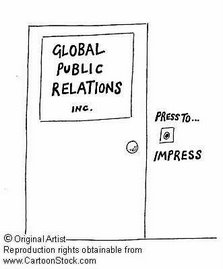Should Public Relations Industry Rush into New Media?
 When I began this blog my debate was inclined more towards yes Public Relations should rush into New Media. But as I began researching more and more into the topic I came across some interesting information that was published by PRWeek, it was a report on the survey that was conducted by KMPG. KMPG is a global network of professional firms providing Audit, Tax, and Advisory services.
When I began this blog my debate was inclined more towards yes Public Relations should rush into New Media. But as I began researching more and more into the topic I came across some interesting information that was published by PRWeek, it was a report on the survey that was conducted by KMPG. KMPG is a global network of professional firms providing Audit, Tax, and Advisory services.
What I found most interesting or rather useful to read is the report that was issued by KPMG, "The Impact of Digitalization – a generation apart". It was a survey of 3000 people, aged from 18 to 65 plus, from the U.K., the U.S., Germany, Spain and the Netherlands explores how different generations across the world are using new media.
I don't necessarily agree with the whole report and some of its findings for example, I am not hundred percent convinced of its claim that despite the growth of new media, television and newspapers remain the primary source of news across all age groups. I might agree if they said more of the older generation still tend to follow the traditional media
The report also includes that over 44 percent of respondents, cited television as their primary news source, followed by newspapers with 28 percent; 14 percent of respondents indicated the radio as their preferred news source and only 13 percent of all respondents preferred the Internet. Which is a bit surprising for the younger generation who are constantly now a days on the net. The survey also highlighted big variations across age groups. For example, Generation Y the under 25’s have the lowest news consumption via TV, with 37 percent choosing this as their primary news source.
The core audience for newspapers is now the over 35’s; on average 32 percent of respondents who are 35 and over use newspapers as their primary news source, with only 7 percent preferring the Internet. In contrast, Generation Y show the highest preference for news on the Internet, with over 30 percent sourcing news this way. This trend continues in to the 25-34 age bracket, with one in four favoring the Internet over newspapers. Only 11 percent of those aged from 35-54 use the Internet for news and this drops to 2 percent for those over the age of 55.
Looking at this report, its quite interesting to see what the future holds for the new media, also to see how it will develop and to see in the coming years whether the new media will take over the traditional media completely. And will it revolutionize the PR field? Even though we can see the new media has many benefits for PR Industries but as we can see that most of us still trust the traditional media that's why we can see still see today the traditional media is alive and kicking.
After reading this report it made me come up with the conclusion that one can not make at this stage any predictions whether the Internet will really revolutionize the PR field or not. And we all know that direct communication is, of course, excellent, but after the initial hype has faded, will audiences still be that interested in trusting of blogs? Since there have been already problems with online PR for example, the issue of flogging practice. We could look at the example of Edelman's who have now legendary attempts to punk the blogosphere on behalf of Wal-Mart and their recent attempt was (Wal-Marting Across America campaign). For further details on this case you can refer to the PRWeek site on the issue of "Industry must self-police flogging". After all, the whole point of journalists is being gatekeepers of information and separating reliable, unbiased information from the rest.
So in my opinion PR practitioners should still be cautious not to overestimate the impact of the new media but let's face it, most of us still tend consume and trust traditional media more than we do blogs. In fact, so far at least, old media are still alive and kicking! And didn't have problems with flogging like the new media has.







4 comments:
New media, thats the buzz in PR today. Your opinion is that the older generation are faithful to traditional media, not necessarily the younger generations. I believe this is a stereotype. I know a lot of people above the age group in the survey who do have access to new media and use them for news. And young people who don’t even use the internet at all. Its very difficult to know just how many people are faithful of either traditional or new media.
Most samples are from urban cities where access is not a problem for many. Move into the more remote areas, a PC with internet is not necessarily in every household. Even in cities, I don’t believe that in every household, there is a PC with internet. Also, for those who have access to both, with more than one child, I’m assuming each person would have time restriction on usage.
Hi Lina
The media environment has changed to include new media and so PR practitioners have to adapt to this change as well. PR practitioners need to make use of the new media as well as the traditional media because they both have their advantages and have an important role to play in PR communications. PR practitioners who engage just in new media or traditional media are doing so at their own risk.What this means is that there is more work for the PR practitioner who now has to master the techniques of using both traditional and new media in order to be more effective in communicating their messages.
Hi Lina
I think the survey conducted by KMPG states some interesting points. If traditional media still is the main source for news, maybe the PR industry should keep their focus there instead of trying to adapt to the new. I think that new media eventually will revolutionise the industry. Meanwhile, PRO’s should focus of the content of their messages rather than speculating in where to publish it.
I think that it's imperative for people in public relations to get involved in all aspects of new media because it is so influential in today's society. However, I believe that, in doing so, they should not ignore the traditional forms of media because I think they will always be around, if only for nostalgic reasons.
Post a Comment